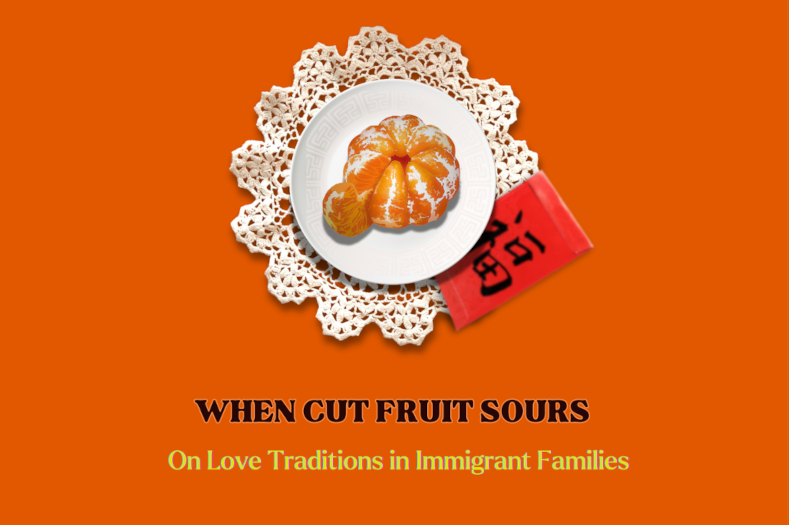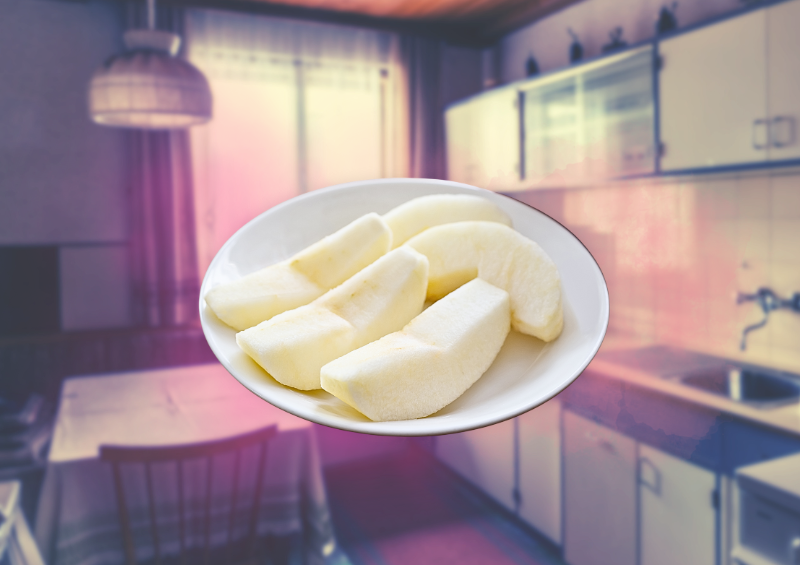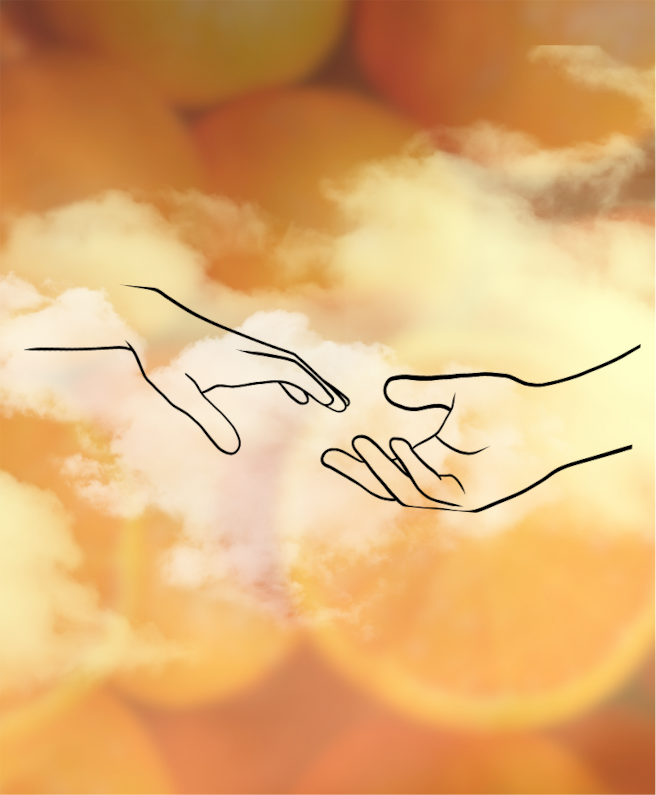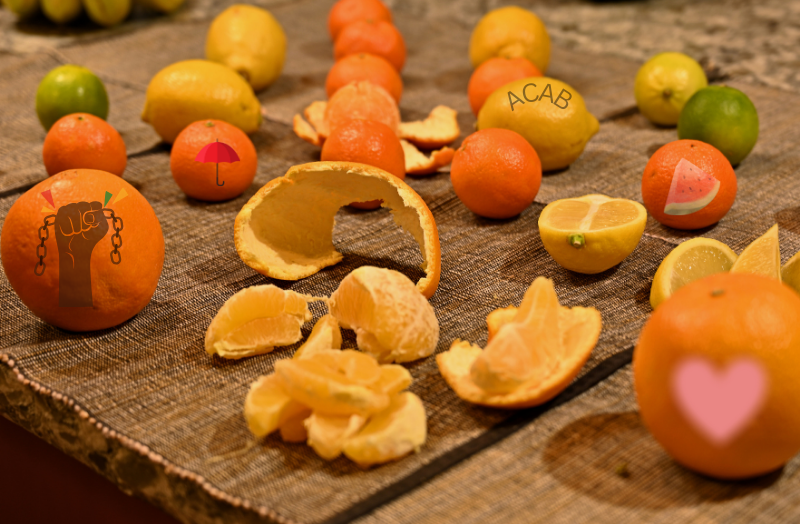
When Cut Fruit Sours
I grew up in Taiwan where the abundance of local fruits showed up on the plates of all homes. A treat at the end of a meal. Encouraged to eat for health. Cut and presented with tiny plastic forks - on display as a gesture for guests. My mom always had cut fruits at the ready in the fridge, presented readily whenever I wanted a snack. Food as an act of care, and particularly cut fruit was a deep part of the tradition.
Traditions as a Life Raft
Traditions are living beings that morph. On a new land, they incorporate the experiences of those enacting them. Immigration turns every aspect of life - no matter how habitual, how routine, into a new disruption. The act of selecting food, paying for it, and bringing it home requires all your attention and energy. Fruit in the markets of southeastern Canada, even with the same names as back home, feel estranged from your senses. A misstep in asking for shopping help or counting change at the cashier has your heart pounding. How relieving it is then, to exercise a care tradition from back home under your own roof in a time of powerlessness. Traditions become the map, the familiar guide to traverse this unfamiliar land. Having a go-to gesture of care feels comforting, especially as the needs of the young ones you immigrated with begin to outgrow your capacity.
And It Became Lore
We tell stories that express our world view. From food media and my fellow immigrant community in Canada and the US, I heard the lore that instead of saying “I love you” or “I’m sorry”, our elders give us food. In these stories, it is presented as the care needed in times of loneliness and disagreements. The balm that soothes all wounds conclusively. I also believed and told this lore for a long time, until I could really look at my experience with cut fruit, and face the reality that was obscured.

My Plate of Cut Fruit
I’ve been given cut fruit like this too many times. In the kitchen, with the air still warm from the heated words exchanged with family hours prior, I would find the simplest sight waiting for me on the counter: glass bowl, ice-like, or a white Corning plate with cool blue trim. On top of it, apples, peeled and cored into a V shape, accompanied with a familiar tiny fork. I know this food used to mean care and abundance to my younger self, before it got colored with the months and years of my needs exceeding my family’s capacity. Over time, it became the solution offered in conflict out of exasperation, like throwing a teacup of water onto a roaring fire, only to watch it hiss before raging higher.
Too often as I sit down at the table, I wonder what I am giving up in receiving this act of care. Is it in taking a bite, I accept that my family can feed my stomach, but leave my heart, mind, and soul empty? Is it in swallowing the fruit, I agree to stop asking questions that will ignite or freeze the room? Most of all, is it in finishing the plate, I abandon the hard conversations I desperately want to be able to foster intimacy?
How I wish there were more options available to me at this table. That I can say yes to the fruit and also be told it was ok to outgrow family expectations. But there were no other choices. It was either I accept the fruit or keep holding onto the confusing pain in my heart. So I swallowed the fruit, washed the plate, rinsed away my hope for true harmony and intimacy. This cycle of fight, fruit, wash away repeats over and over and becomes the dance of our relationship, and perpetuates the narrative that this is love and apology.
True Love Shatters Illusions
What I washed down the sink came back to find me through a book. Black text rippling across the auspicious red cover: “all about love”. Bell hooks named genuine love as multidimensional; a combination of care, commitment, trust, knowledge, responsibility, and respect. Her telling of her reckoning with family pressed the air out of my lungs: “I am grateful to have been raised in a family that was caring, and strongly believe that had my parents been loved well by their parents, they would have given that love to their children. They gave what they had been given—care. Remember, care is a dimension of love, but simply care does not mean we are loving.”
Hooks said she had moments of affection, delight, and care, but did not experience her family exercising true love: “…the will to extend one’s self for the purpose of nurturing one’s own or another’s spiritual growth.” Her words, sharp and cutting, pared what love is down to the core, and rendered my perception of cut fruit clear as day: I was deeply cared for through it, but rarely was I loved. When a plate of fruit is offered in the context of true love, the smallest morsel nourishes and unburdens the spirit, soothes the burning pain of conflict, laying the way for sutures, healing, and transformation. But when it is given as the “be-all” concluding solution to all the complexities of relationships, the fruit sours and leaves me wounded and wanting. But I did not want to admit I was not truly loved in my family. So I propped up cut fruit and being materially provided for as love. It was painful to admit to myself that this traditional gesture of care had actually become a sign of lovelessness in my most primary relationships.

And Then There’s Chosen Kin
Perhaps because facing the complicated lovelessness in family is too daunting, some of us readily accept simplified stories about ourselves and our community. Too many times I’ve heard clients who long for love dismiss themselves and their elders in broad strokes. “They’re from a different generation.” “It’s just not our culture.” “I am asking for too much.” But what limiting statements. In dismissing a whole generation and culture, we foreclose the possibility of finding love beyond the nuclear family structure. The actual way through is to face the heartbreaking reality: that due to colonization, many of our wounded elders cannot love us in this lifetime. In order to survive all the ways oppression had dehumanized them, they hardened themselves and stayed hardened. The rigid exterior prevented harmful agents from seeping in, but also shut out transformative love that can invigorate their living. And because this is the way they know, they taught it to us and called it tradition.
Why Do We Accept Lovelessness?
I fear that in avoiding the pain that some elders are incapable of true love, we accept lovelessness as our culture. Many of us, in surviving the debilitating impact of oppression and migration, gripped onto our communities of origin and biological families as lifesavers. It may have kept our heads above water, but we cannot have true safety if we don’t struggle to shore and seek out elders that can speak the fullness of our love language. When I broaden my search for love to justice-oriented communities, I saw loving elders alive and thriving. I saw Asian elders cooking for protesters of all ages, of silver-haired organizers safeguarding the history of Chinatown. And very recently, a parent mending the keffiyeh for their adult child fighting for Palestinian liberation.
My concern for the lore of cut fruit is that its function has been perpetuated beyond its purpose, like a spell casted not because it was suitable, but because the evoker did not know what else was possible. I fear in choosing to call cut fruit love, we falsely perpetuate love as “at least I provided for you.” Saying we can only speak limited phrases of love when we come from people who have created centuries of passionate and loving art, that is diminishing our collective humanity. That is colonial.

Cut Me a Plate of Love
I want to reimagine the role and the lore of cut fruit. That we see it for what it is, and be thoughtful and conscientious about its role in our traditions. That love isn’t always food, but food can be part of being loving. I want us to evoke it as part of a larger menu of love, served on tables that are invested in fostering one another’s spiritual development. I long for a love so expansive, that it leaves generous room for other ways of love to join the feast. Cut fruit is a start, a way to care, an interlude before inviting more hard and loving conversations. I yearn for a plate that can bring us closer in times of disagreement and also harmony. Cut me a plate with love so pure I have no doubt about what I'm ingesting. I think it tastes sweeter that way.
